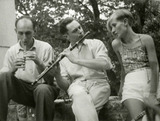Photograph of Lisa Tetzner and Kurt Kläber, Carona 1933
Photograph of Lisa Tetzner and Kurt Kläber, Carona 1933
Ahnten wir uns?
Dunkel war mein Leben,
Bis Deine Seele wie ein Licht
Aus dem Dunkel sprang.
Seitdem ist mein Leben
Ein jauchzender Gottesgesang.
Alles ist Hand,
Was ich fasse.
Und wenn ich Dich lasse,
Sind alle Dinge,
Zwischen Dir und mir
Ein Band.[Did we suspect?
Dark was my life, until your soul sprang
from the gloom like a light.
Since then my life has been
an exuberant and joyful chant.
Everything I touch
is hand. And when I
take my leave of you,
all things between you and me
bind us together. (ed. trans.)]
Kurt Kläber, Poem for Lisa Tetzner
Lisa Tetzner and Kurt Kläber were a couple for forty years. They met in Thuringia after the First World War, where both were on the road (Tetzner as a storyteller, Kläber as a travelling salesman). Kläber, who introduced himself to his future wife at their first encounter as a “professional revolutionary”, earned a living at that time as a miner, among other things, and also wrote poems and journalistic articles. In 1925, a year after they married, he became a member of the KPD (Communist Party of Germany) and worked during the years until Hitler came to power for various left-wing magazines and publishers.
Following the Reichstag fire, Kläber was arrested but released again two days later thanks to his wife’s connections. He fled via Prague to Switzerland where the couple had a summer house. Lisa Tetzner followed him only a few days later and their house became a meeting place for émigrés. From 1933 until 1935, when he left the KPD, Kläber commuted between Paris and Carona and was involved in Comintern activities.
Because of her husband’s political and her life in Swiss exile, Tetzner was expelled from the Reich Literature Chamber (Reichsschrifttumskammer). Her husband did not receive a work permit for Switzerland meaning that Tetzner had to earn a living for both of them by giving lessons. She also made efforts to have her books translated and to find a Swiss publisher.




